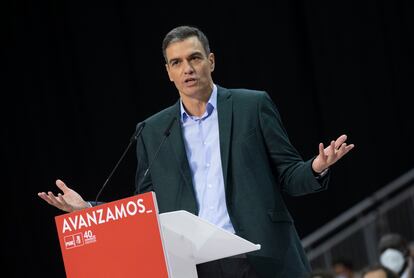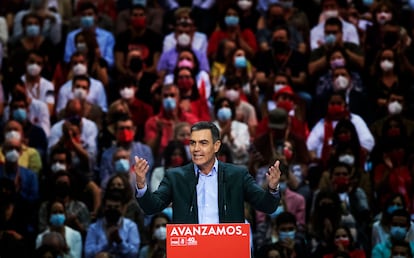Labor reforms and the abolition of prostitution: Spain’s prime minister sets out policy targets at party congress
A message of unity was transmitted by Pedro Sánchez at the three-day event in Valencia, at which former leaders Felipe González and José Luis Rodríguez Zapatero were also present

Former Spanish prime ministers Felipe González and José Luis Rodríguez Zapatero were present this weekend at their Socialist Party’s (PSOE) 40th Federal Congress, which was held over three days at the Fira de Valencia conference center in the eastern Mediterranean city. The presence of the historical leaders at the event cemented a message of unity transmitted by the governing party, and the congress also saw current Prime Minister Pedro Sánchez set out his policy targets for the coming years. These include overturning labor reforms introduced by the conservative Popular Party (PP) and the so-called “gag law,” as well as abolishing prostitution.
During his closing speech on Sunday, Sánchez reflected on the achievements so far of his government, which is a coalition of the PSOE and junior partner Unidas Podemos. These include passing a law regulating euthanasia, raising the minimum wage, introducing a guaranteed minimum income scheme and making reforms to the pension system. “We will move forward putting an end to legislation such as the gag law and the PP’s labor reforms, which were imposed without agreements and made contracts more precarious and devalued salaries,” he explained. “We will move forward strengthening Europe. And we will move forward abolishing the prostitution that enslaves women.” Prostitution was decriminalized in Spain in 1995, and is not currently illegal. But exploitation such as pimping is punishable under the country’s criminal code.
Changes to labor laws were among the demands expressed at the conference the day before by representatives of the two main unions in Spain, CCOO and UGT. These changes are currently being negotiated by Labor Minister Yolanda Díaz, of Unidas Podemos, with unions and business associations. These changes will have to be ready by the end of the year, as per commitments made to the European Union. There is, however, opposition among business leaders regarding several issues, meaning that Sánchez will soon have to decide whether to move forward without the blessing of the associations as he did with the latest rise in the minimum wage. His message this weekend at the congress was a warning to the sector that he is serious about the reforms.
The gag law, meanwhile, is controversial legislation approved by the PP in 2015. It was criticized from day one for impeding freedom of expression because it established fines for doing things like protesting in front of parliament or taking and sharing photographs of police officers. The opposition claimed it was a way to clamp down on the street protests taking place at the time against political corruption and mismanagement of the economic crisis.

The abolition of the gag law has long been a demand of Unidas Podemos, but progress has stalled in the lower house of parliament, the Congress of Deputies. A simple order from Sánchez, however, would quickly reactivate the process given that work was already far advanced.
Criminalizing prostitution, meanwhile, would be a completely new policy approach for the government, and Sánchez went much further in his commitment to clamping down on such activity than had been agreed in the previous debates that were approved at the conference in Valencia.
More than 5,000 people enthusiastically applauded the prime minister’s speech, delivered at what was a somewhat unusual PSOE party conference: absent were the usual fierce internal debates and power struggles, and instead there was a festive atmosphere complete with fireworks and giant paellas. What’s more, there was the symbolic photo of Sánchez, Felipe González and José Luis Rodríguez Zapatero embracing, representing the old guard in harmony with the new.
We will move forward abolishing the prostitution that enslaves womenSpanish Prime Minister Pedro Sánchez
Sánchez’s position has been strengthened in recent months thanks to a major Cabinet reshuffle, as well as the relieving of his chief of staff Iván Redondo, a controversial behind-the-scenes figure who was responsible for the government’s political strategy. The prime minister sought to convey this message of unity on Sunday: “This congress expresses a powerful reality,” he said. “The PSOE is a united, open party, one that debates freely. There are a number of generations of Socialists here. Now more than ever the social-democratic project is based on protecting society and the environment. We belong to the most noble political tradition. Today the project is strong across the world, because it has proved to be more human, fairer and more economically efficient.”
Sánchez’s speech was preceded by messages from social democrats all over the world, such as the future German Chancellor Olaf Scholz and also more traditional figures on the left such as former Brazilian president Lula da Silva. His words were a defense of social democracy in the face of the emerging forms of right-wing politics, and the idea that, in the wake of the coronavirus pandemic, now is the time to demonstrate that neoliberal ideas are damaging for citizens, in particular those who most need the support of the state in difficult times.
“They told us that social democracy was in crisis,” he said. “And how are those who spoke of this faring? Is their model the Hungary of Orban? The US of Trump? The United Kingdom of Brexit? Those who are in crisis are those who promoted policies that widened inequalities. A large number of Europeans defend the value of the public. The [Covid-19] vaccines arrived according to medical needs and not according to the size of someone’s wallet. That is social democracy, the most modern, current ideals.”

Sánchez arrived at the Congress during the same week that he was booed, whistled at and jeered during the traditional military parade held in Madrid every year on October 12. He is also constantly targeted by opposition parties such as the PP and far-right Vox. But during his speech, he brushed this off, and argued that the same thing happened to his predecessors González and Zapatero.
“The smears are the same as those received by Felipe or Zapatero when they governed,” he said. “Political trumpism scorns politics, but still seeks power. This is taking root in our country, and is contaminating the traditional right wing. Democracy is only valid for them when they are governing. They accuse us of wanting to break up Spain. They used to say this about Felipe and Zapatero. But it is not credible, because if there is a party that loves Spain it is the PSOE. There is a reason why we are the only political force with a decisive presence in the whole country.”
Sánchez and his team emerged euphoric from this, the first PSOE congress without internal battles in the last 15 years. The party has already agreed to the 2022 budget with its coalition partners, Unidas Podemos, and now must seek the support of other groups given that the government lacks a working majority in Congress. It is also preparing for the new battles announced by Sánchez, over the labor reform, gag law and prostitution. Despite the constant calls from the opposition for new elections, it was clear at the weekend that the PSOE has every intention of seeing out the current political term, with the next general election due in November 2023. This will depend, of course, on whether or not the upcoming votes in Congress are accompanied by the same enthusiasm seen in Valencia this weekend.
Tu suscripción se está usando en otro dispositivo
¿Quieres añadir otro usuario a tu suscripción?
Si continúas leyendo en este dispositivo, no se podrá leer en el otro.
FlechaTu suscripción se está usando en otro dispositivo y solo puedes acceder a EL PAÍS desde un dispositivo a la vez.
Si quieres compartir tu cuenta, cambia tu suscripción a la modalidad Premium, así podrás añadir otro usuario. Cada uno accederá con su propia cuenta de email, lo que os permitirá personalizar vuestra experiencia en EL PAÍS.
¿Tienes una suscripción de empresa? Accede aquí para contratar más cuentas.
En el caso de no saber quién está usando tu cuenta, te recomendamos cambiar tu contraseña aquí.
Si decides continuar compartiendo tu cuenta, este mensaje se mostrará en tu dispositivo y en el de la otra persona que está usando tu cuenta de forma indefinida, afectando a tu experiencia de lectura. Puedes consultar aquí los términos y condiciones de la suscripción digital.








































